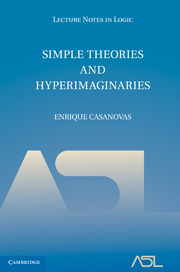Book contents
- Frontmatter
- Contents
- PREFACE
- CHAPTER 1 PRELIMINARIES
- CHAPTER 2 φ-TYPES, STABILITY, AND SIMPLICITY
- CHAPTER 3 Δ-TYPES AND THE LOCAL RANK D(π,Δ,k)
- CHAPTER 4 FORKING
- CHAPTER 5 INDEPENDENCE
- CHAPTER 6 THE LOCAL RANK CBΔ(π)
- CHAPTER 7 HEIRS AND COHEIRS
- CHAPTER 8 STABLE FORKING
- CHAPTER 9 LASCAR STRONG TYPES
- CHAPTER 10 THE INDEPENDENCE THEOREM
- CHAPTER 11 CANONICAL BASES
- CHAPTER 12 ABSTRACT INDEPENDENCE RELATIONS
- CHAPTER 13 SUPERSIMPLE THEORIES
- CHAPTER 14 MORE RANKS
- CHAPTER 15 HYPERIMAGINARIES
- CHAPTER 16 HYPERIMAGINARY FORKING
- CHAPTER 17 CANONICAL BASES REVISITED
- CHAPTER 18 ELIMINATION OF HYPERIMAGINARIES
- CHAPTER 19 ORTHOGONALITY AND ANALYSABILITY
- CHAPTER 20 HYPERIMAGINARIES IN SUPERSIMPLE THEORIES
- REFERENCES
- INDEX
CHAPTER 11 - CANONICAL BASES
Published online by Cambridge University Press: 05 March 2012
- Frontmatter
- Contents
- PREFACE
- CHAPTER 1 PRELIMINARIES
- CHAPTER 2 φ-TYPES, STABILITY, AND SIMPLICITY
- CHAPTER 3 Δ-TYPES AND THE LOCAL RANK D(π,Δ,k)
- CHAPTER 4 FORKING
- CHAPTER 5 INDEPENDENCE
- CHAPTER 6 THE LOCAL RANK CBΔ(π)
- CHAPTER 7 HEIRS AND COHEIRS
- CHAPTER 8 STABLE FORKING
- CHAPTER 9 LASCAR STRONG TYPES
- CHAPTER 10 THE INDEPENDENCE THEOREM
- CHAPTER 11 CANONICAL BASES
- CHAPTER 12 ABSTRACT INDEPENDENCE RELATIONS
- CHAPTER 13 SUPERSIMPLE THEORIES
- CHAPTER 14 MORE RANKS
- CHAPTER 15 HYPERIMAGINARIES
- CHAPTER 16 HYPERIMAGINARY FORKING
- CHAPTER 17 CANONICAL BASES REVISITED
- CHAPTER 18 ELIMINATION OF HYPERIMAGINARIES
- CHAPTER 19 ORTHOGONALITY AND ANALYSABILITY
- CHAPTER 20 HYPERIMAGINARIES IN SUPERSIMPLE THEORIES
- REFERENCES
- INDEX
Summary
Definition 11.1. The multiplicity of a type p(x) ∈ S(A) is the number Mlt(p) of its global nonforking extensions p(x) ∈ S(ℭ). If there is a proper class of global nonforking extensions of p, we say that p has unbounded multiplicity and we write Mlt(p) = ∞; otherwise we say that p has bounded multiplicity. A stationary type is a type of multiplicity 1. Thus over any B ⊇ A a stationary type p(x) ∈ S(A) has a unique nonforking extension q(x) ∈ S(B). We use the notation p|B for q.
Lemma 11.2. Let T be simple. If p ∈ S(A) is stationary, then its global nonforking extension is Definable over A.
Proof. Let p be the global nonforking extension of p, and let φ(x, y) ∈ L. We will show that p ↾ φ is A-definable. Let Δφ(y) and Δ¬φ(y) be types over A given by Corollary 5.23 for p and φ and for p and ¬φ respectively. By compactness, the conjunction ψ(y) of a finite subset of Δφ(y) is inconsistent with Δ¬φ(y). It is clear that ψ(y) defines p ↾ φ.
Corollary 11.3. Let T be simple. If types over models are stationary, then T is stable.
Proof. Lemma 11.2 implies that in this situation every global type is Definable.
- Type
- Chapter
- Information
- Simple Theories and Hyperimaginaries , pp. 69 - 74Publisher: Cambridge University PressPrint publication year: 2011



